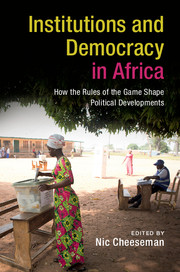Book contents
- Frontmatter
- Dedication
- Contents
- List of Figures
- List of Tables
- List of Contributors
- 1 Introduction: Understanding African Politics: Bringing the State Back In
- Part I Institutional Foundations
- Part II Law and Order
- Part III Elections, Parties and Political Competition
- Part IV Countervailing Institutions
- 12 The Legislature: Institutional Strengthening in Dominant-Party States
- 13 The Judiciary: Courts, Judges and the Rule of Law
- 14 Decentralisation: Accountability in Local Government
- 15 Conclusion: Political Institutions and Democracy in Africa: A Research Agenda
- Index
- References
12 - The Legislature: Institutional Strengthening in Dominant-Party States
from Part IV - Countervailing Institutions
Published online by Cambridge University Press: 05 February 2018
- Frontmatter
- Dedication
- Contents
- List of Figures
- List of Tables
- List of Contributors
- 1 Introduction: Understanding African Politics: Bringing the State Back In
- Part I Institutional Foundations
- Part II Law and Order
- Part III Elections, Parties and Political Competition
- Part IV Countervailing Institutions
- 12 The Legislature: Institutional Strengthening in Dominant-Party States
- 13 The Judiciary: Courts, Judges and the Rule of Law
- 14 Decentralisation: Accountability in Local Government
- 15 Conclusion: Political Institutions and Democracy in Africa: A Research Agenda
- Index
- References
Summary
African legislatures are typically viewed as pliant and docile bodies, the quintessential ‘rubber stamp’ institution. They have, consequently, been largely neglected in the study of African politics while the executive has remained the primary preoccupation of researchers. This trend reflects the enduring legacy of neo-patrimonial theory, with its emphasis on presidential patronage politics, as the lens through which much of the literature views the continent (Chapter 1). Even after the ‘third wave’ of democratisation brought new political openings, scholars gravitated towards the study of elections – deemed critical in securing democratic gains – while largely ignoring parliament, a mere ‘sideshow’ according to some (van de Walle 2003).
Yet, the stereotype of the irrelevant ‘rubber stamp’ legislature appears increasingly divorced from the various instances of legislative activism recurring across the continent. In this vein, the Ugandan legislature threatened a government shutdown over an unsatisfactory health budget; the Tanzania parliament forced seven Cabinet reshuffles over the space of two presidential terms; and South African MPs from the Economic Freedom Fighters party captivated TV audiences nationwide by repeatedly calling President Jacob Zuma a thief in response to allegations of corruption. This legislative assertiveness has brought fresh scholarly interest in African parliaments. This is also being driven by normative concerns, as scholars take note of the broader comparative literature, which contends that robust parliaments promote both stronger democracies (Fish 2006) and improved development outcomes through greater executive accountability (Santiso 2005). Out of this growing interest, a new research agenda is beginning to materialise, namely to explain variation in legislative institutional development across African states, its causes and consequences.
The emerging literature has not advanced very far. While it has improved our empirical knowledge of how African parliaments operate, theoretical advances remain minimal. A key issue is the tendency to focus on individual factors that influence institutional development across a range of disparate case studies. There is little sense of how these various factors and case studies relate, or what they contribute to our cumulative understanding of legislative strengthening. The most influential contribution to date, Joel Barkan's edited volume from 2009, presents itself as the ‘first comparative effort at theorizing about the process of legislative development on the continent’ (Barkan 2009: 5–6). The book offers many valuable insights; yet, even so, the analysis remains focused on the proximate triggers of legislative development and says less about underlying structural causes.
- Type
- Chapter
- Information
- Institutions and Democracy in AfricaHow the Rules of the Game Shape Political Developments, pp. 281 - 303Publisher: Cambridge University PressPrint publication year: 2018
References
- 10
- Cited by



